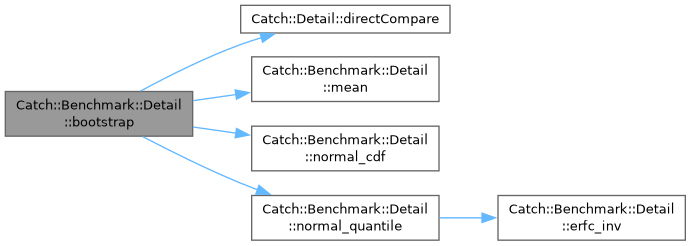Classes | |
| struct | BenchmarkFunction |
| struct | bootstrap_analysis |
| struct | ChronometerConcept |
| struct | ChronometerModel |
| struct | CompleteInvoker |
| struct | CompleteInvoker< void > |
| struct | CompleteType |
| struct | CompleteType< void > |
| struct | do_nothing |
| struct | is_related |
| struct | ObjectStorage |
| struct | optimized_away_error |
| struct | repeater |
Typedefs | |
| template<typename T> | |
| using | CompleteType_t = typename CompleteType<T>::type |
| template<typename Clock, typename Fun> | |
| using | run_for_at_least_argument_t = std::conditional_t<is_callable<Fun(Chronometer)>::value, Chronometer, int> |
| using | sample = std::vector<double> |
Functions | |
| SampleAnalysis | analyse (const IConfig &cfg, FDuration *first, FDuration *last) |
| void | throw_optimized_away_error () |
| double | weighted_average_quantile (int k, int q, double *first, double *last) |
| OutlierClassification | classify_outliers (double const *first, double const *last) |
| double | mean (double const *first, double const *last) |
| double | normal_cdf (double x) |
| double | erfc_inv (double x) |
| double | normal_quantile (double p) |
| Estimate< double > | bootstrap (double confidence_level, double *first, double *last, sample const &resample, double(*estimator)(double const *, double const *)) |
| bootstrap_analysis | analyse_samples (double confidence_level, unsigned int n_resamples, double *first, double *last) |
| template<typename Fun> | |
| repeater< std::decay_t< Fun > > | repeat (Fun &&fun) |
| template<typename Fun, typename... Args> | |
| CompleteType_t< FunctionReturnType< Fun, Args... > > | complete_invoke (Fun &&fun, Args &&... args) |
| template<typename Clock, typename Fun, typename... Args> | |
| TimingOf< Fun, Args... > | measure (Fun &&fun, Args &&... args) |
| template<typename Clock, typename Fun> | |
| TimingOf< Fun, int > | measure_one (Fun &&fun, int iters, std::false_type) |
| template<typename Clock, typename Fun> | |
| TimingOf< Fun, Chronometer > | measure_one (Fun &&fun, int iters, std::true_type) |
| template<typename Clock, typename Fun> | |
| TimingOf< Fun, run_for_at_least_argument_t< Clock, Fun > > | run_for_at_least (IDuration how_long, const int initial_iterations, Fun &&fun) |
| template<typename Clock> | |
| std::vector< double > | resolution (int k) |
| template<typename Clock> | |
| int | warmup () |
| template<typename Clock> | |
| EnvironmentEstimate | estimate_clock_resolution (int iterations) |
| template<typename Clock> | |
| EnvironmentEstimate | estimate_clock_cost (FDuration resolution) |
| template<typename Clock> | |
| Environment | measure_environment () |
Variables | |
| constexpr auto | warmup_iterations = 10000 |
| constexpr auto | warmup_time = std::chrono::milliseconds(100) |
| constexpr auto | minimum_ticks = 1000 |
| constexpr auto | warmup_seed = 10000 |
| constexpr auto | clock_resolution_estimation_time = std::chrono::milliseconds(500) |
| constexpr auto | clock_cost_estimation_time_limit = std::chrono::seconds(1) |
| constexpr auto | clock_cost_estimation_tick_limit = 100000 |
| constexpr auto | clock_cost_estimation_time = std::chrono::milliseconds(10) |
| constexpr auto | clock_cost_estimation_iterations = 10000 |
| using Catch::Benchmark::Detail::CompleteType_t = typename CompleteType<T>::type |
| using Catch::Benchmark::Detail::run_for_at_least_argument_t = std::conditional_t<is_callable<Fun(Chronometer)>::value, Chronometer, int> |
| using Catch::Benchmark::Detail::sample = std::vector<double> |
| SampleAnalysis Catch::Benchmark::Detail::analyse | ( | const IConfig & | cfg, |
| FDuration * | first, | ||
| FDuration * | last ) |


| bootstrap_analysis Catch::Benchmark::Detail::analyse_samples | ( | double | confidence_level, |
| unsigned int | n_resamples, | ||
| double * | first, | ||
| double * | last ) |


| Estimate< double > Catch::Benchmark::Detail::bootstrap | ( | double | confidence_level, |
| double * | first, | ||
| double * | last, | ||
| sample const & | resample, | ||
| double(* | estimator )(double const *, double const *) ) |


| OutlierClassification Catch::Benchmark::Detail::classify_outliers | ( | double const * | first, |
| double const * | last ) |


| CompleteType_t< FunctionReturnType< Fun, Args... > > Catch::Benchmark::Detail::complete_invoke | ( | Fun && | fun, |
| Args &&... | args ) |


| double Catch::Benchmark::Detail::erfc_inv | ( | double | x | ) |

| EnvironmentEstimate Catch::Benchmark::Detail::estimate_clock_cost | ( | FDuration | resolution | ) |


| EnvironmentEstimate Catch::Benchmark::Detail::estimate_clock_resolution | ( | int | iterations | ) |


| double Catch::Benchmark::Detail::mean | ( | double const * | first, |
| double const * | last ) |

| TimingOf< Fun, Args... > Catch::Benchmark::Detail::measure | ( | Fun && | fun, |
| Args &&... | args ) |


| Environment Catch::Benchmark::Detail::measure_environment | ( | ) |


| TimingOf< Fun, int > Catch::Benchmark::Detail::measure_one | ( | Fun && | fun, |
| int | iters, | ||
| std::false_type | ) |


| TimingOf< Fun, Chronometer > Catch::Benchmark::Detail::measure_one | ( | Fun && | fun, |
| int | iters, | ||
| std::true_type | ) |

| double Catch::Benchmark::Detail::normal_cdf | ( | double | x | ) |

| double Catch::Benchmark::Detail::normal_quantile | ( | double | p | ) |


| repeater< std::decay_t< Fun > > Catch::Benchmark::Detail::repeat | ( | Fun && | fun | ) |


| std::vector< double > Catch::Benchmark::Detail::resolution | ( | int | k | ) |


| TimingOf< Fun, run_for_at_least_argument_t< Clock, Fun > > Catch::Benchmark::Detail::run_for_at_least | ( | IDuration | how_long, |
| const int | initial_iterations, | ||
| Fun && | fun ) |


| void Catch::Benchmark::Detail::throw_optimized_away_error | ( | ) |


| int Catch::Benchmark::Detail::warmup | ( | ) |


| double Catch::Benchmark::Detail::weighted_average_quantile | ( | int | k, |
| int | q, | ||
| double * | first, | ||
| double * | last ) |


|
constexpr |
|
constexpr |
|
constexpr |
|
constexpr |
|
constexpr |
|
constexpr |
|
constexpr |
|
constexpr |
|
constexpr |